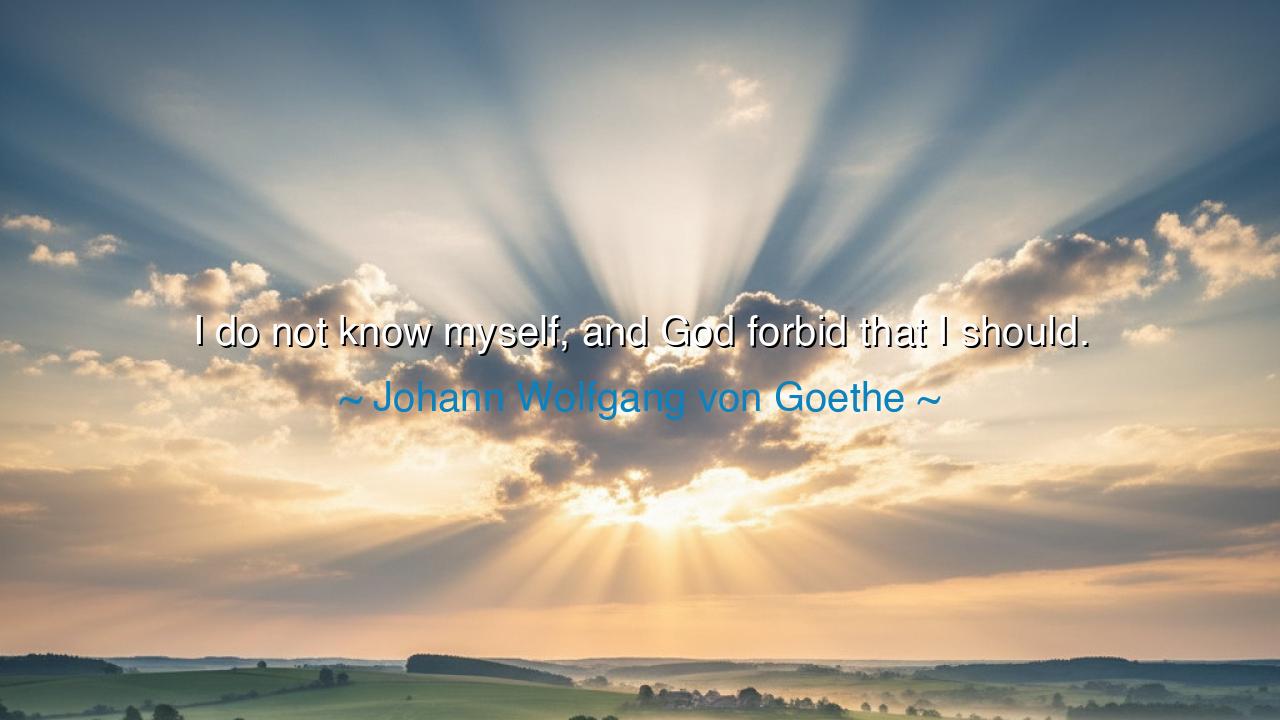
I do not know myself, and God forbid that I should.






The profound words of Johann Wolfgang von Goethe, one of the greatest minds of the European Renaissance, strike at the heart of human mystery: “I do not know myself, and God forbid that I should.” In this striking declaration lies a paradox both terrifying and liberating: the recognition that the human soul is an infinite landscape, too vast and intricate to be fully grasped. Goethe, a poet, thinker, and seeker, reminds us that self-knowledge is not a possession to be claimed lightly. To peer fully into one’s own depths is to confront the boundless complexity, the darkness and the light, the contradictions that dwell within every heart.
The origin of this quote lies in Goethe’s lifelong engagement with philosophy, literature, and human psychology. Throughout his works—from Faust to his scientific treatises—Goethe explored the tension between human curiosity and the limits of understanding. He recognized that each life is a theater of conflicting passions, moral ambiguities, and uncharted desires. To claim complete self-knowledge, Goethe suggests, is to tempt the soul toward arrogance or despair. Better, he implies, to embrace the mystery of the self as a source of humility, wonder, and creative inspiration.
At the heart of Goethe’s insight is the fear and respect for the unknown within. The human heart harbors impulses that reason cannot fully control, motives that consciousness cannot fully explain. To know oneself entirely would be to confront not only the noble and virtuous but also the shadowed and chaotic elements that lurk unseen. Goethe’s plea—“God forbid that I should”—reveals his understanding that some knowledge is too vast, too potent, for the fragile human mind to contain. In acknowledging this, he finds a kind of wisdom: humility before the self, reverence for life’s complexity, and freedom from the tyranny of total understanding.
History provides living examples of this struggle. Consider Leonardo da Vinci, the Renaissance master who mapped the human body, charted the stars, and pondered the mechanics of thought. Despite his prodigious intellect, he admitted the limits of his own understanding, endlessly sketching, experimenting, and questioning. Like Goethe, he recognized that the self is a labyrinth, and that the journey of discovery is more vital than the destination of certainty. To confront one’s own mind without humility risks becoming a prisoner of pride or fear.
Goethe’s words also speak to the creative soul, the artist, the thinker, and the seeker. Self-discovery fuels insight, yet complete mastery over one’s impulses and contradictions might suffocate the spontaneity that inspires beauty and innovation. By leaving the self partially unknown, Goethe suggests, one preserves the tension, the mystery, and the vitality that animate human endeavor. The unknown is not merely a danger—it is a source of awe, reflection, and growth.
Emotion courses through this declaration because it touches the eternal human struggle: the desire to know, to master, and to understand, pitted against the humility and reverence demanded by the vastness within. Goethe invites us to embrace uncertainty, to cultivate wonder at our own contradictions, and to temper curiosity with respect. There is courage in admitting limits, and serenity in accepting that some truths are beyond our grasp.
The practical lesson is profound. Approach life with both self-reflection and humility. Seek to understand your motives, actions, and desires, yet recognize that complete self-knowledge may be neither possible nor desirable. Embrace the mystery as a teacher: let it inspire growth, empathy, and creativity, rather than fear or despair. By accepting the unknown within, we cultivate patience, compassion, and reverence for the journey of life.
Thus, the words of Goethe endure as both warning and inspiration: “I do not know myself, and God forbid that I should.” Let them remind us that the soul is an ocean of depths, that wisdom lies in humility, and that life’s greatest insights often emerge not from certainty, but from reverent exploration of the unknown. In acknowledging the mystery within, we awaken courage, imagination, and the eternal pursuit of understanding that defines the human spirit.






AAdministratorAdministrator
Welcome, honored guests. Please leave a comment, we will respond soon